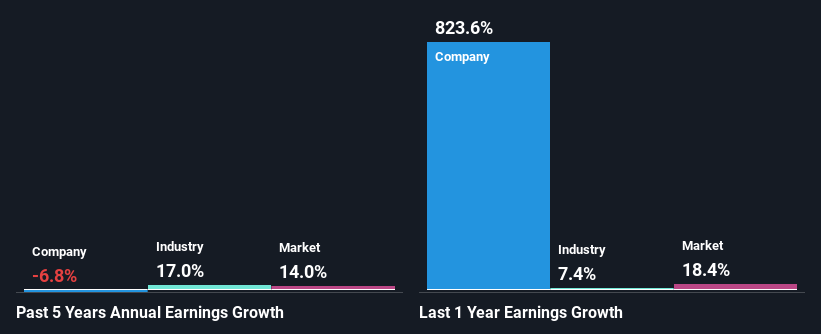- Bulgaria
- /
- Construction
- /
- BUL:T57
Has Trace Group Hold PLC's (BUL:T57) Impressive Stock Performance Got Anything to Do With Its Fundamentals?

Most readers would already be aware that Trace Group Hold's (BUL:T57) stock increased significantly by 17% over the past month. We wonder if and what role the company's financials play in that price change as a company's long-term fundamentals usually dictate market outcomes. Specifically, we decided to study Trace Group Hold's ROE in this article.
Return on Equity or ROE is a test of how effectively a company is growing its value and managing investors’ money. Put another way, it reveals the company's success at turning shareholder investments into profits.
View our latest analysis for Trace Group Hold
How To Calculate Return On Equity?
The formula for return on equity is:
Return on Equity = Net Profit (from continuing operations) ÷ Shareholders' Equity
So, based on the above formula, the ROE for Trace Group Hold is:
13% = лв20m ÷ лв150m (Based on the trailing twelve months to March 2024).
The 'return' is the yearly profit. One way to conceptualize this is that for each BGN1 of shareholders' capital it has, the company made BGN0.13 in profit.
What Is The Relationship Between ROE And Earnings Growth?
We have already established that ROE serves as an efficient profit-generating gauge for a company's future earnings. Depending on how much of these profits the company reinvests or "retains", and how effectively it does so, we are then able to assess a company’s earnings growth potential. Assuming all else is equal, companies that have both a higher return on equity and higher profit retention are usually the ones that have a higher growth rate when compared to companies that don't have the same features.
Trace Group Hold's Earnings Growth And 13% ROE
At first glance, Trace Group Hold seems to have a decent ROE. And on comparing with the industry, we found that the the average industry ROE is similar at 14%. For this reason, Trace Group Hold's five year net income decline of 6.8% raises the question as to why the decent ROE didn't translate into growth. Based on this, we feel that there might be other reasons which haven't been discussed so far in this article that could be hampering the company's growth. Such as, the company pays out a huge portion of its earnings as dividends, or is faced with competitive pressures.
So, as a next step, we compared Trace Group Hold's performance against the industry and were disappointed to discover that while the company has been shrinking its earnings, the industry has been growing its earnings at a rate of 17% over the last few years.

Earnings growth is an important metric to consider when valuing a stock. What investors need to determine next is if the expected earnings growth, or the lack of it, is already built into the share price. By doing so, they will have an idea if the stock is headed into clear blue waters or if swampy waters await. One good indicator of expected earnings growth is the P/E ratio which determines the price the market is willing to pay for a stock based on its earnings prospects. So, you may want to check if Trace Group Hold is trading on a high P/E or a low P/E, relative to its industry.
Is Trace Group Hold Using Its Retained Earnings Effectively?
Trace Group Hold's declining earnings is not surprising given how the company is spending most of its profits in paying dividends, judging by its three-year median payout ratio of 50% (or a retention ratio of 50%). With only very little left to reinvest into the business, growth in earnings is far from likely. Our risks dashboard should have the 4 risks we have identified for Trace Group Hold.
Additionally, Trace Group Hold has paid dividends over a period of at least ten years, which means that the company's management is determined to pay dividends even if it means little to no earnings growth.
Conclusion
In total, it does look like Trace Group Hold has some positive aspects to its business. Yet, the low earnings growth is a bit concerning, especially given that the company has a high rate of return. Investors could have benefitted from the high ROE, had the company been reinvesting more of its earnings. As discussed earlier, the company is retaining a small portion of its profits. Until now, we have only just grazed the surface of the company's past performance by looking at the company's fundamentals. You can do your own research on Trace Group Hold and see how it has performed in the past by looking at this FREE detailed graph of past earnings, revenue and cash flows.
Valuation is complex, but we're here to simplify it.
Discover if Trace Group Hold might be undervalued or overvalued with our detailed analysis, featuring fair value estimates, potential risks, dividends, insider trades, and its financial condition.
Access Free AnalysisHave feedback on this article? Concerned about the content? Get in touch with us directly. Alternatively, email editorial-team (at) simplywallst.com.
This article by Simply Wall St is general in nature. We provide commentary based on historical data and analyst forecasts only using an unbiased methodology and our articles are not intended to be financial advice. It does not constitute a recommendation to buy or sell any stock, and does not take account of your objectives, or your financial situation. We aim to bring you long-term focused analysis driven by fundamental data. Note that our analysis may not factor in the latest price-sensitive company announcements or qualitative material. Simply Wall St has no position in any stocks mentioned.
About BUL:T57
Trace Group Hold
Through its subsidiaries, provides construction services for road infrastructure projects in Bulgaria and internationally.
Medium-low with mediocre balance sheet.


